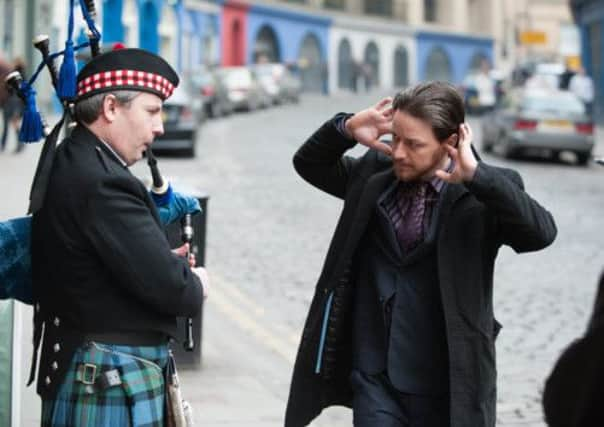Film review: Filth


Filth (18)
Director: Jon S Baird
Running time: 97 minutes
* * * *
No wonder filmmakers are drawn to his work – often fatally. While Trainspotting was a great success, the mutilated corpses of The Acid House and Ecstasy are best forgotten. Most notoriously, there is Filth: regarded as one of the author’s best works, and usually with the qualification of “unfilmable” attached.
Picking up the gauntlet is Peterhead film-maker Jon S Baird. Filth is only his second film, but maybe young directors have greater reserves of moxie. Baird certainly doesn’t shy away from confrontation, opening with snapshots of a grotty Scottish capital, and its even grittier denizens. After touring Edinburgh’s labyrinthine closes and alleys, his camera eventually locates Edinburgh cop Bruce Robertson (James McAvoy), whose mindset is even darker and more twisted.
Advertisement
Hide AdIt’s Christmas, but the only spirit that moves Robertson is alcohol, and his festive mood is coloured by a bipolar disorder, remotely supervised by Jim Broadbent’s doctor. Robertson is after a promotion, which pits him against colleagues like his naïve sidekick Ray (Jamie Bell), metrosexual smoothie Peter (Emun Elliott), the joyously dopey Gus (Gary Lewis) and the crisply efficient Amanda (Imogen Poots). Solving a recent murder might fast-track him to the job, but so could sabotaging and undermining his co-workers. Robertson’s moral apocalypse spares no-one. At home, he’s already driven away his wife and child, and he regularly betrays his milquetoast best pal Bladesy (Eddie Marsan) by sleeping with his wife (Shirley Henderson – not the only echo of Trainspotting here).
Robertson’s desperate brutality is a game-changer for McAvoy. A bantam-built actor with heavyweight versatility, he’s playing a character who is older, sweatier and more thrillingly squalid than anything else he has played so far. Filth is his showcase, and McAvoy invests the role with an avidity that is almost frightening. Yet he’s also good at registering Robertson’s discombobulation when he meets a young widow (Joanne Froggatt) who offers him a glimpse of redemption.
This is not a movie you could take your mother to see. Then again, you can’t say you weren’t warned: this is called Filth, not The Laughing Policeman. Some of the book’s viciousness has been toned down but the film doesn’t shrink from the particulars of Robertson’s transgressive behaviour: there are drugs, hookers and, as light relief, a Christmas party where the men photocopy their genitals. Baird’s script largely dispenses with the novel’s chatty tapeworm, but contributes surreal twists of its own – such as David Soul leading a singalong of Silver Lady and Weimar cabaret-inflected fantasies.
Not everything works in Filth – the film walks a tightrope between cleverness and gimmickry, deprecation and disgust, hardboiled hilarity and hard-bitten heartlessness. As a movie experience it is both gruelling and transcendent, but its best scenes can prey on your mind for days.